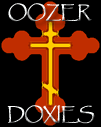How the Grinch Stole Back Christmas
‘Tis a tale often told, and every Who knows,
How the Grinch first descended from Mount Crumpet snows
And stole away Christmas (its trappings, at least)
Then had his heart changed, and came back for roast beast.
Not everyone knows what has happened since then;
How the Grinch came to think he must steal it again –
For Grinches are grinchy, and grinch-genes will tell
–And in some ways, he wasn’t adjusting too well.
Though his heart grew three sizes, his brain had not shrunk
And he tired of buying up masses of junk
And dealing with hassles and hustles barbaric
For “holidays” swiftly becoming generic.
The customs traditional, which the Grinch loved
Were watered-down, fluffed-up, or “new and improved”
.Why, at one Christmas feast, by one misguided Who,
The roast beast itself was a glob of tofu!
And the songs which reformed him with simple Who joys
Were increasingly drowned out by “noise, noise, noise, noise.”
And deep in his heart, underneath his green fur,
The Grinch knew that things weren’t right as they were.
His ponderer once more was sore as could be
In the checkout line near the HDTV’s,
When the half-hearted clerk with a faraway gaze
Blandly muttered to him, “Happy Holidays”.
Well, the Grinch’s lips curled in a most Grinchy smile
(More grinchy, perhaps, than he’d been in a while!)
He remembered his heritage, cunning and sly,
He thought, “I was made this way – p’raps this is why!”
Then he fixed his eyes on the unfortunate knave,
And regarded him mildly, and told him, “How brave!”
“Brave?”, asked the clerk, “Why, what did I say?”
“My good man, you have wished me a fine Holy Day!“
I thank, good sir, and return it sincerely;
“For you wished for me, sir, not a merry day merely,
“But a day blessed with favor from our Lord divine –
“I return it; may your Holy Day, too, be fine!”
“No! I just said ‘holiday’,” stammered the clerk,
“For that is the policy here where I work…”
“Delightful!,” the Grinch interjected with glee.
“Such corporate boldness – it overwhelms me!
“A spiritual awakening – that’s what it means!
“Now, sir, sell me some cards with nativity scenes.”
There were no such cards, for he’d sold his last few
But he did have a Santa. The Grinch said, “He’ll do,“
That old Bishop Nicholas, merry and stout.
“He once punched the heretic Arius out!”
And the clerk looked about – and no bosses he saw -
“Merry Christmas!,” he whispered, and shook a grinch paw.
The Grinch strode from the store and out into the street,
“Merry Christmas!”, he said to each Who whom he’d meet,
And he said to himself, “Why, this really is nice!
“A good deed which has gained all the thrill of a vice!
“This holiday season need not make me blue;
“For with each ‘Merry Christmas’, I break a taboo!”
Some heartily answer, returning his greeting;
And others more shyly, ere swiftly retreating –
Some say “Happy Hannukah” back with a grin,
Which the old Grinch returns, and calls that a win/win.
Some never quite notice; too stressed and engrossed.
But some look offended – and these he likes most.
“Now, don’t kid a kidder,” he tells such a one –
“I stole Christmas once, and I know how it’s done.
“But I stole it with style; I stole it with flare.
“You aren’t that clever, or else wouldn’t dare;
“To my exploits, your Christmas theft can’t hold a candle –
“You’re not even a thief – just a wannabe vandal.”
For a Grinch is a Grinch, at the end of the day
(And as he observed, Someone made him that way)
As wise as a serpent (and almost as green)
And not really worried if folks think he’s mean.
He stole Christmas once, but he made his amends –
Now he’ll steal Christmas back, for his more timid friends.
So when you’ve the chance (if, that is, you’ve the guts)
Please join me and the Grinch, driving PC-folks nuts.
Reclaiming the Holy Days, joyous and rightful,
From the purely commercial or pettily spiteful.
Co-conspire in this bold holiday counter-crime –
Committed one “Merry Christmas” at a time.
— Joe Long
(Posted at
MereComments)









